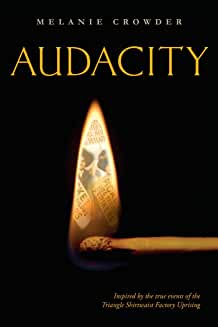AUDACITY: Inspired by the True Events of the Triangle Shirtwaist Factory Uprising
 AUDACITY: Inspired by the True Events of the Triangle Shirtwaist Factory Uprising, by Melanie Crowder
AUDACITY: Inspired by the True Events of the Triangle Shirtwaist Factory Uprising, by Melanie Crowder
(New York: Speak, Penguin Random House, 2016)
I have something to say.
The words of Clara Lemlich, teenage and ageless fighter and organizer, a life illuminated in a prose poem by Melanie Crowder.
Poems, a poem on every page, capturing a day, a feeling, a scene, a struggle, a beating, a friend, a book, a class, a smile.
A life so typical and yet so atypical. One of thousands, hundreds of thousands, coming to America out of hope, desperation. But one of thousands, hundred of thousands, who said, not just felt, said, we don’t have to live this way.
I have something to say.
Everyone did have something to say about the injustice at home and work, everyone does, but so many of them, so many of us, say it to ourselves, to a friend, friends, in isolated conversations or furtive whispers…
…but the poems in Audacity express the personality, the process, of one young woman who spoke up to people who needed to hear it, who didn’t want to hear it, men, older men, in the union, in the sweatshops, who expected young women to work, be quiet, work, submit, make babies, make profits, make no trouble.
But I look around
at the rows and rows
of immigrant girls,
heads down
voices silent
and I wish this better life
did not come
at such a price.
The shetl, the steamship, the sweatshop, the anti-Semitism, the sexism, the poems moving from one phase of life to the next, each with stoicism, curiosity, love and anger.
I have something to say.
Clara Lemlich did, but Melanie Crowder does also, in a biography unlike any other. Describing the work, the growth, the beatings, the stifling home life, the cold, the noise, the people, the friends, through the eyes of the people, one person, who went through it, and decided not to take it.
whispers
At lunch
the children play jacks
in the corner
the girls chat
in between bites.
From the drapers’ table
I hear a new word
whispered
with a hard edge
furtive eyes
darting to the foreman’s desk:
union
I think this is a word
I need to understand.
Every page, every poem, a fragment of a life, trying to build a life in a world built around profits. Labor histories appeal mostly to people interested in, well, labor history; Audacity is written for anyone who had, or has, something to say, or whose ancestors did, however silent or silenced their voices. Audacity, the unique vivid poetic narrative about one young Jewish Russian immigrant sweatshop worker who actually said it.
Reviewed by Joshua Barnett, an affordable housing activist, architect at the New York City Housing Authority since 1999, union rep in Local 375, DC 37, AFSCME, third-generation unionist and Brooklynite.
